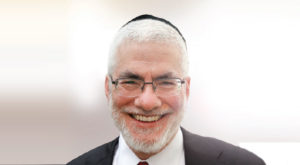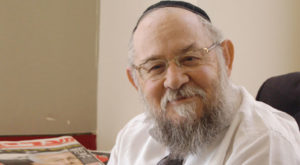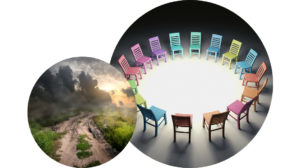No Room for Doubt

He is King and it’s His Will and Word, not ours, that is the very definition of truth
Around nine years ago, after I had written a column about the then-newly appointed president of Yale University, a descendant of Rav Chaim Volozhiner, I received a call from his sister, who, along with another brother, is now Torah-observant.
She wanted me to know that although Yale’s president wasn’t fully observant like his siblings, he maintained a connection to Jewish practice and participated in weekly family conference calls to say Tehillim for an ill family member. Most of all, she wanted me to know that besides being her brother,
in a different way, he is your brother too. Do you remember standing with him at Har Sinai? Hashem doesn’t give up on us. It is easy enough to look at someone being promoted in the secular press as a “hero” of non-Torah life and assume he has no inner calling to aspire spiritually. Indeed, he affectionately uses our term to refer to himself as “not-yet frum.” I would like to hope that teshuvah is not beyond his reach. The more difficult task would be to feel heartbroken over the possible loss of a member of the Jewish family, and to use that sadness as motivation to bring him close with love, respect, and patience.
My conversation with her made me realize that although what I had written was factually correct and mildly stated, what did not come through was that he’s not just Yale’s president, but also a fellow Yid, whose distance from Torah should pain me. I noted at the time that there’s more to writing like a Jew than just complying with the halachos of lashon hara; there are also the feelings that come through subtly between the lines.
But perhaps I didn’t learn well enough from that episode. Several weeks ago, I received an email from a woman regarding how I uncharitably described a certain group of non-observant Jews, her relatives, as unthinking and unmoved by the beauty of Hashem’s world to embrace His mitzvos. I didn’t say it quite so directly, but obliquely, employing what I thought was a clever play on words. And had anyone asked me as I was writing those words if I actually meant to indict anyone of thoughtlessness and spiritual numbness, I would have said no.
But as I reread what I’d written, it was clear she was right. I was ashamed. We spoke by phone and I made a sincere apology. How does such a thing happen? In part, I think it may be related to the experience of living in a culture of certainty.
Secular modernity created a world hopelessly riddled with doubt, in which everything is up for unending questioning and certainty is unattainable. Even science, which is accorded such reverence, is only a process for trying to arrive at truth, and long-standing theories are regularly disproved and discarded in favor of new ones. As for anything not amenable to the scientific process, including the most important questions there are — such as “Why is there a world?” and “What are we doing here?” — they are regarded as inherently unanswerable.
As believing Jews, we reject this worldview. We are uniquely fortunate to have a Torah that is pure emes, and we possess a mesorah of the fundamentals of emunah that our minds know and our neshamos experience to be true.
True, we have a belief system of certainty, but we also have to ensure that it does not transmute into a culture of certitude. That is to say, if frum Jews espouse the Torah’s teachings, they are right – not because whatever frum Jews say is true but because whatever the Torah says is true.
The problem arises when positions on certain issues begin to take on a quasi-religious aura of authoritativeness simply because they are popular in frum culture, which itself is not based in — or may even be alien to — authentic Torah sources and values. The certainty reserved for Torah alone gets extended undeservedly to beliefs and opinions adjudged to be true simply because a percentage of frum Jews hold them. We forget that without Torah, we’re as fallible as anyone else — maybe more so, considering all the misguided movements Jews have founded and led.
The empty, smugly complacent certitude which, if we’re not careful, can be a derivative of frum culture can also evolve all too easily into ugly condescension towards those not fortunate to be Torah-observant. As the woman I mentioned earlier wrote to me, “We are not ignorant, as implied — we know ‘how to think.’ What we think is that some people are arrogant and judgmental and say things to make themselves look better. Words are powerful, and words hurt.”
Many of us are familiar with the fact that “Amalek” is the numerical equivalent of “safek,” doubt. But the doubt that refers to is the kind Bnei Yisrael experienced when Amalek first attacked at Refidim, when the nation wondered “Hayesh Hashem b’kirbeinu ihm ayin, is Hashem really within our midst or not?” That’s the sort of uncertainty we should strive to dispel and replace with clarity.
But the existence of doubt is inherent in the human experience. The whole of Shas and its commentaries are replete with unresolved difficulties, even if we have halachic rules on how to proceed nonetheless. And sometimes, we are called upon to actually embrace doubt, as in Chazal’s teaching (Berachos 4a), “Accustom your tongue to say ‘I don’t know.’” Such acceptance of doubt is a sign of spiritual maturity and humility. And, of course, a person needs a healthy measure of self-doubt, in order to know that the human capacity to stumble exists until the day of death, just as Yochanan Kohein Gadol abandoned his roots and became a tzeduki when he was 80.
This is part of the problem with the unprecedented political hyper-partisanship that has infected our community in recent years. Ikarei emunah and Taryag mitzvos are Torah; economics, immigration, race and the environment, et al, are not.
True, the Torah has much to say about everything that takes place in Hashem’s world. But anyone who studies the aforementioned issues and others like them will realize many of them are quite complex, and that venturing an informed opinion requires wide reading, lots of empirical data and a consideration of a multiplicity of nuanced views. And when Torah sources are brought to bear, we’ll often see that they don’t line up neatly with either side in this country’s polarized debates. How many frum Jews have the will and wherewithal to do that homework and adduce those sources, rather than adopt whatever prevailing frum culture and their partisan political echo chamber dictates?
Several weeks ago, Rav Avraham Dov Auerbach, the second-oldest son of Rav Shlomo Zalman, was niftar at the age of 86. Reading about this great gaon and tzaddik, a major posek who spent decades as the rav of Tiveria, I came across a fascinating insight he shared about his older brother Reb Shmuel after his passing three years ago.
“My brother,” he observed, “wasn’t at all conservative by nature, and indeed, he was broadminded and able to relate to many different views. The conservative positions he took as a leader of Yidden didn’t emanate from personality preferences, but instead from a clear vision about the need to preserve the authentic character of the Torah community as it has always been. There are those, however, who are conservative in temperament, and when they become leaders, it’s their nature that’s leading them, instead of them following a principled path of truth….”
An attitude of certitude, too, must be the servant of the truth, flowing from it, not what determines and shapes it.
The Gemara (Rosh Hashanah 16a) asks, “Why do we blow shofar?” And although Rav Saadia Gaon provides ten different perspectives on what the shofar blasts represent, the Gemara mentions none of them in explaining why we blow — only “Because the Torah said ‘Blow.’ ” And as we blow, we coronate Hashem, with unswerving certainty that He is King and that it’s His Will and Word, and not ours, that is the very definition of truth.
Originally featured in Mishpacha, Issue 876. Eytan Kobre may be contacted directly at kobre@mishpacha.com
Oops! We could not locate your form.












